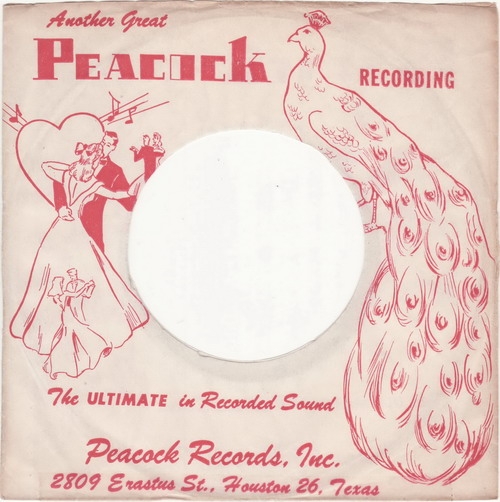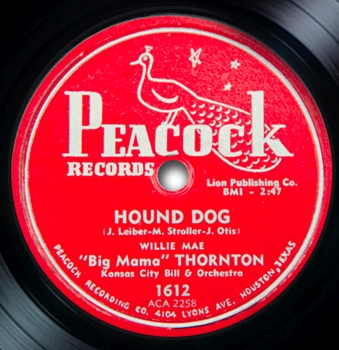Collectors are drawn to certain brands for various reasons. Enormous ubiquity is one; Coca Cola, Disney, RCA Victor and Motown are examples of iconic brands that people collect just because they are there and have been for a long time. Others are desirable because of their consistent, high-quality output, which usually flows from the vision of one person, or at least one person who gets the credit.
Peacock Records is a brand that will not be familiar to many outside the music collectors’ community (and indeed, to quite a few inside it) but it has a dedicated following among music fans because they were consistently good.
 In operation from 1949 to 1975 in Houston, Texas, Peacock, and its sister label Duke, produced some of the best and most influential blues, rhythm and blues, gospel and soul records of the era. This black-owned company in a white man’s business in the Deep South thrived despite the adverse conditions.
In operation from 1949 to 1975 in Houston, Texas, Peacock, and its sister label Duke, produced some of the best and most influential blues, rhythm and blues, gospel and soul records of the era. This black-owned company in a white man’s business in the Deep South thrived despite the adverse conditions.
It takes a fighter to pull that kind of thing off and Don Robey, who founded and ran the Peacock, fits the bill perfectly. His reputation was legendary; he kept a loaded 45 on his office desk and didn’t hesitate to wave it about during negotiations. He had a unique CV; professional gambler, nightclub owner, a sometimes violent and unethical businessman, suspected gangster and one of America’s largest purveyors of Christian music, he is credited with writing most of it, but he didn’t.
Born in Houston in 1903 he dropped out of school at age 16 to become a professional gambler. He made enough money at it to get himself started in business, first in a taxi company then moving to entertainment. After a brief stint running a night club in Los Angeles, he returned to Houston in 1945 and opened his own club called The Bronze Peacock Dinner Club.
The club became a regular spot for most of the top R&B acts in the country. In 1947 Houston-based singer Clarence “Gatemouth” Brown played at the Peacock and Robey was so impressed he started a new company, Buffalo Booking Agency, and signed Brown to a management contract. This was a good move but the most important thing he did was to hire a young woman named Evelyn Johnson to run the agency.
While Don Robey was the front man, the name everybody knew, Evelyn Johnson, a name that few knew, has been described as the “true genius” behind the operation. It was Johnson, under Robey’s direction, who researched the mechanics of the music business for two years and set up Peacock Records in 1949 to record Brown and other talent that Robey signed, and she managed.
The first Peacock issues, all blues, did well enough to keep the company going and they began to build a pretty impressive roster that included Memphis Slim, Johnny Otis, Willie Mae “Big Mama” Thornton and Little Richard. Little Richard’s two issues on Peacock in 1956 were straight blues and not commercially successful. It was Big Mama Thornton, a large, formidable woman who reportedly “scared the hell out of everybody except Robey” who put the company on the map. Her 1952 recording of Hound Dog was a No. 1 smash all over the country, staying at the top of the Billboard R&B chart for an astonishing seven weeks.
 The song was written by then-fledgling songwriters Jerry Leiber and Mike Stoller specifically for Thornton who impressed them with her rough style, imposing size and the razor blade scars all over her face. The record sold about a million copies in 1953 but Leiber and Stoller received no royalties until Elvis Presley recorded the song in 1956.
The song was written by then-fledgling songwriters Jerry Leiber and Mike Stoller specifically for Thornton who impressed them with her rough style, imposing size and the razor blade scars all over her face. The record sold about a million copies in 1953 but Leiber and Stoller received no royalties until Elvis Presley recorded the song in 1956.
There was more than one dispute over that record. The backing band was lead by Johnny Otis, he played drums and his regular guitarist, Pete Lewis, added the sizzling guitar work. Otis got no credit, and never forgave Leiber and Stoller for the oversight.
About this time Robey acquired another small label, Duke Records of Memphis Tennessee and moved it to Houston. Duke was struggling financially but had a great roster of stars including hit-makers Johnny Ace and Bobby Bland. Ace died soon after supposedly playing Russian roulette back stage but Bland went on to become the top blues star in America along with B.B. King, who was also managed by Buffalo Booking Agency though he never recorded for Robey.
Robey also started to sign a large number of gospel singers to his labels. He obviously wasn’t religious, but Evelyn Johnson was and Robey never missed an opportunity to make a buck. Gospel music was very popular in the south, on par with blues and R&B. The only other major gospel label based in the south, Nashboro, did very well but there was room for improvement. Although they had some great artists the production was often sloppy, instruments were out of tune, and it seemed they would sign just about anybody whether they could sing or not. It didn’t matter; every release got radio play because Nashboro was owned by Ernie Young, who owned Ernie’s Record Mart which sponsored a show on WLAC, a powerful station heard throughout the south.
Robey (or more likely it was Johnson) insisted on high quality production and singing. All singers had to audition and any who were off key or did not enunciate their words clearly were sent home. Although he did have his own studio many recordings were done in Chicago where there were better facilities and back-up musicians. Blues legend Willie Dixon played on a lot of Peacock gospel records.
He signed some great singers; The Five Blind Boys, The Dixie Hummingbirds, The Sensational Nightingales and The Bells of Joy were top-flight acts at the peak of their form and popularity. They were so successful that by the late 1950s Roby re-structured his company so Peacock released gospel exclusively while blues and R&B acts were all moved over to Duke. He then closed his Bronze Peacock Dinner Club and used the location on Erastus Street in Houston exclusively for his record business.
That address is important to hard-core collectors. In the beginning Peacock ran out of a building on Lyons Ave. First pressings of records made before 1953 have the Lyons Ave. address on the label; later pressings with the Erastus Street address have less value.
During the 1960s with Bobby Bland at the top of the blues scene and gospel at the peak of its popularity, Peacock was, well, flying high. Robey started two new labels, Back Beat for the new soul sound (a combination of R&B and gospel) and Song Bird for more modern gospel groups. By the late 60s he started issuing soul and R&B on Peacock again and these later records are now highly prized by Northern Soul collectors in Britain.
However, by then Motown and Stax Records were dominating the soul scene, Robey’s gambling and hard life was starting to catch up with him. In poor health he sold everything to ABC-Dunhill in 1973. At the time it was estimated he held copyright on over 2,500 songs though it’s doubtful he had a hand in writing any of them, it was just another way Robey extracted maximum dollar out of every release. He continued with the company after its sale but died in 1975. Soon after, ABC-Dunhill pulled the plug on the whole operation.
The City of Houston erected a plaque outside the original Lyons Ave. headquarters, there are sporadic re-issues and an excellent book by Galen Gart and Roy C. Ames that is just about impossible to find. Other than that, there is the music, on millions of records, many being re-sold for prices that would make Don Robey’s head spin faster than the barrel of a Colt 45.
